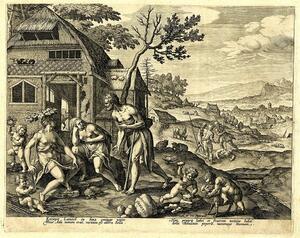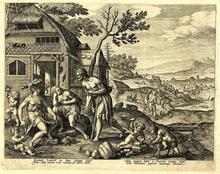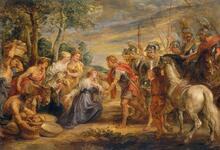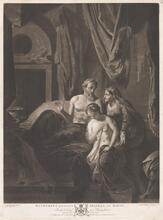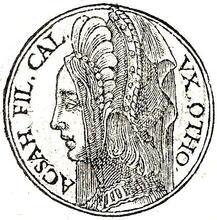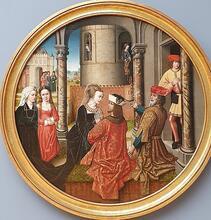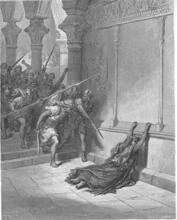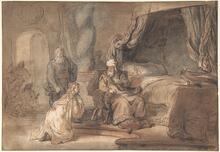Zillah: Midrash and Aggadah
This 1583 engraving print by Jan Sadeler depicts Lamech (center), an Israelite ancestor, and his two wives Zillah and Adah, seated at left. It is part of a series of prints titled "The Story of the First Men." Source: The British Museum, via Wikimedia Commons.
Zillah was a wife of Lamech. According to one tradition, Zillah was designated to bear children, but in another tradition she was said to solely provide intercourse for Lamech. Nonetheless, she bore two children. Later, she and Lamech’s other wife, Adah, discover Lamech after he unwittingly kills Tubal-Cain. They refuse to have sex with him because of the deaths he caused, on the pretext that they do not desire to give birth to cursed offspring. The three go together to the tribunal of Adam; Adam rules that they must obey their husband since he killed unwittingly. This midrashic tradition portrays Adah and Zillah as respected women, whose position is considered in all seriousness by the court.
Article
According to the aggadic tradition, Lamech took two wives, one for sexual pleasure and the other for procreation. One wife would be in his company adorned like a harlot, and he plied her with a drug that induced barrenness, so that she would not give birth; the other sat alone, like a widow. Lamech’s behavior graphically attests to the process of spiritual decline from one generation to the next and the corruption of the Flood generation.
There are two contradictory traditions regarding the marriage of Zillah. According to one (JT Yevamot 6:5, 7c) she was designated to bear children, as her name implies: “Zillah—for she dwelled there by merit [literally, in the shadow—zilah] of children”; while the second (Gen. Rabbah 23:2) maintains that Lamech married her for intercourse: “Zillah—for she would sit in his shadow [be-ziloh],” i.e., solely to provide pleasure. Nonetheless, she bore him Tubal-cain and Naamah, which might be the meaning of “As for Zillah, she [also] bore Tubal-cain” (Gen. 4:22), even though he had married her solely for intercourse.
The A type of non-halakhic literary activitiy of the Rabbis for interpreting non-legal material according to special principles of interpretation (hermeneutical rules).midrash also relates (Tanhuma, Genesis 11) that after Lamech unwittingly killed Cain and Tubal-cain, Adah and Zillah found him with his two victims. When they brought him home, he demanded to engage in relations with them. Adah and Zillah refused their husband’s advances because of the deaths he caused, on the pretext that they did not desire to give birth to cursed offspring. The three agree to go together to the tribunal of Adam; after hearing the women’s arguments, Adam rules that they must obey their husband, since he killed unwittingly. According to another tradition (Gen. Rabbah, 23:2), Adam tells them: “You do what is yours to do, and God will do what is for Him to do.” The two wives answer Adam with the proverb, “Physician, heal thyself,” thus telling Adam that he himself must act as he has decreed for them, for, according to the Statements that are not Scripturally dependent and that pertain to ethics, traditions and actions of the Rabbis; the non-legal (non-halakhic) material of the Talmud.aggdah (Gen. Rabbah, 23:2), “Adam withdrew from his wife for one hundred and thirty years following the murder of Abel.
In the end, Adah and Zillah heed Adam’s verdict and give themselves to Lamech, resulting in the birth of Noah. Adam also listens to the two women and returns to his wife, who gives birth to Seth, the progenitor of the line of Shem. This midrashic tradition, which is based on the juxtaposition of the song of Lamech and the birth of Seth, portrays Adah and Zillah as respected women, whose position is considered in all seriousness by the court. Although the ruling nevertheless favors the husband, the words of wisdom voiced by the two wives in the course of the trial have far-reaching consequences for the personal life of the judge and for the fate of the entire human race.

